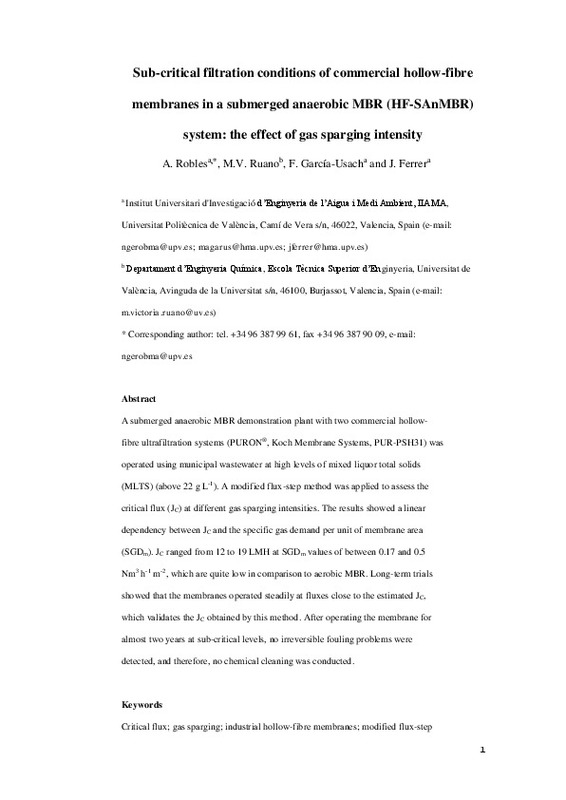Mollá Romano, S.; Compañ Moreno, V. (2011). Polyvinyl alcohol nanofiber reinforced Nafion membranes for fuel cell applications. Journal of Membrane Science. 372(1-2):191-200. https://doi.org/10.1016/j.memsci.2011.02.001
Por favor, use este identificador para citar o enlazar este ítem: http://hdl.handle.net/10251/64222
|
Título:
|
Polyvinyl alcohol nanofiber reinforced Nafion membranes for fuel cell applications
|
|
Autor:
|
Mollá Romano, Sergio

 Compañ Moreno, Vicente
Compañ Moreno, Vicente
|
|
Entidad UPV:
|
Universitat Politècnica de València. Departamento de Termodinámica Aplicada - Departament de Termodinàmica Aplicada
|
|
Fecha difusión:
|
|
|
Resumen:
|
This work has been focused on the preparation and characterization of composite membranes with thickness between 19 and 97 mu m and containing Nafion(R) infiltrated into a porous mat obtained by electrospinning of an aqueous ...[+]
This work has been focused on the preparation and characterization of composite membranes with thickness between 19 and 97 mu m and containing Nafion(R) infiltrated into a porous mat obtained by electrospinning of an aqueous solution of Poly vinyl alcohol (PVA). The mat was composed of PVA nanofibers with diameters between 200 and 300 nm, which were functionalized on their external surface with sulfonic acid groups in order to cooperate in the proton conductivity of Nafione(R). The proton conductivity of a composite membrane (47 mu m thick) measured by impedance spectroscopy reached 0.022 S/cm at 70 degrees C and fully hydrated. This value is lower than the conductivity measured in the same conditions for a pristine Nafion(R) cast membrane (46 mu m), 0.032 S/cm. However, the performance of both membranes in Direct Methanol Fuel Cell tests was evaluated and showed comparable results. The proton conductivity of a series of cast Nafion(R) membranes with thickness similar to those of the composite membranes was found to behave linearly thickness-dependent, while NAF/PVA composite membranes do not show such a linear behavior due to their heterogeneous composition. Nevertheless, the composite membrane presenting a thickness of 47 mu m records the maximum peak conductivities at the whole temperature range. An intrinsic value for the activation energy of our cast Nafion(R) membranes at fully hydrated conditions was estimated to be 7 kJ/mol.
[-]
|
|
Palabras clave:
|
Conductivity
,
DMFC performance
,
Nanocomposite Nafion® membranes
,
PEMFC
,
PVA nanofibers
,
Aqueous solutions
,
Cast membrane
,
Direct methanol
,
External surfaces
,
Fuel cell application
,
Functionalized
,
Heterogeneous composition
,
Impedance spectroscopy
,
Linear behavior
,
Nafion membrane
,
Sulfonic acid groups
,
Temperature range
,
Activation energy
,
Chemical analysis
,
Direct methanol fuel cells (DMFC)
,
Hydration
,
Methanol
,
Methanol fuels
,
Nanocomposites
,
Nanofibers
,
Proton conductivity
,
Proton exchange membrane fuel cells (PEMFC)
,
Composite membranes
,
Nanocomposite
,
Nanofiber
,
Polyvinyl alcohol
,
Sulfonic acid derivative
,
Water
,
Article
,
Differential scanning calorimetry
,
Ion exchange
,
Membrane
,
Membrane conductance
,
Membrane transport
,
Nanotechnology
,
Priority journal
,
Proton transport
,
Scanning electron microscopy
,
Thermogravimetry
,
Water transport
|
|
Derechos de uso:
|
Cerrado |
|
Fuente:
|
Journal of Membrane Science. (issn:
0376-7388
)
|
|
DOI:
|
10.1016/j.memsci.2011.02.001
|
|
Editorial:
|
Elsevier
|
|
Versión del editor:
|
http://dx.doi.org/10.1016/j.memsci.2011.02.001
|
|
Código del Proyecto:
|
info:eu-repo/grantAgreement/GVA//IMIDIC%2F2009%2F155/ES/Materiales y componentes para pilas de combustible de membranas de intercambio protónico (PEMFC) y de metanol directo (DMFC)/
|
|
Agradecimientos:
|
This work has been supported by the Valencian Institute of Small and Medium-Sized Enterprises (IMPIVA) and the European Regional Development Funds, through the project IMIDIC/2009/155.
|
|
Tipo:
|
Artículo
|






![[Cerrado]](/themes/UPV/images/candado.png)



